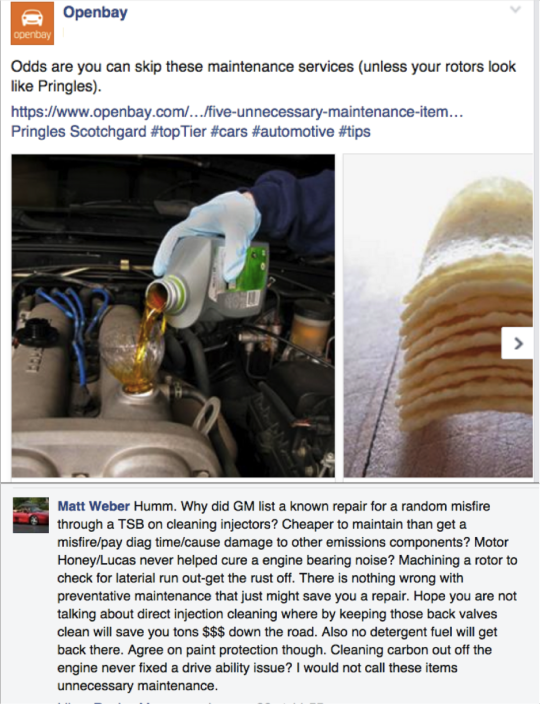Happy National Car Care Month! To encourage the conversation about car maintenance, we spoke with Matt Weber, a repair shop owner, who took issue with some of the maintenance items we thought customers might be able to skip.
Earlier this year, we posted an article by automotive-repair expert and Popular Mechanics veteran, Mike Allen, called “Five unnecessary maintenance items you can postpone—or skip altogether.”
Once we shared it to our Facebook page, Matt Weber, owner of Clark’s Car Care in Naperville, IL, responded with his thoughts on the article. He clearly wanted to tell us more. We embraced the opportunity to say hello, so picked up the phone to learn more about Matt’s idea about which car maintenance items he deemed important vs. unnecessary.
Here’s Matt Weber’s take on:
Additives
Some call it “Mechanic in a can.” It’s maintenance, and there have been several times I’ve seen it save cars. Of course it’s not a guaranteed fix.
I’d compare it to vitamins – just because you take vitamins doesn’t mean you’re not going to get sick, but it can’t hurt. There have been many cases where auto manufacturers and myself have been saved.
Sometimes there are mixed messages about additives, such as one from GM. GM had said to flush the system at 100-150K miles. They’ve had bulletins saying, “Don’t use additives,” but then they advised everyone to use an additive to make the fix.
Same goes for fuel injector cleaners. If they get clogged, you have to clean them with additives, even if you’re advised against it. It’s like a dentist saying, “Don’t brush your teeth,” but then, once you get a cavity, “Fill it.”

Here were Matt’s Facebook comments that inspired us to get in touch to learn more.
Machining the brake rotors
Machining rotors is a thing of the past. We don’t do it much anymore.
Several manufacturers (BMW, some GM cars) are going that way. Also, they’re not as extensive as they used to be. Rotors don’t like heat, so the more metal you take away, the more susceptible they are to heat.
If a rotor has been on a car for 30,000 miles, it’s already thin, so if you machine them, you’re almost opening up a bigger problem. Plus, rotors don’t cost $130 anymore – they’re much less expensive. Better just replace them.
Fuel Injection Cleaner
The modern-day engine is more prone to carbon buildup. Once you get too much carbon in an engine, it can easily cost $2,000 to fix.
Now, with direct fuel injection, you get better gas mileage. But if you don’t maintain it, it’ll cost you big bucks.
In regards to fuel, there are many different types of fuel out there – E85, summer and winter blends – so your car is getting lots of different types of fuel and it’s difficult to digest.
The cleaners don’t get on the back sides of the valves, where the carbon develops.
I’d recommend having fuel injection decarbonization done every 30,000-50,000 miles.
Paint Protection at Purchase
Mike Allen’s piece is 100% correct. The modern day car has plenty of protection on there. That’s just a profit center, and purchasing paint protection is a total waste of money. Paint protection comes from the factory.
When you get paint protection done, it’s almost like painting over mold. If there’s any moisture, dirt or debris, you could actually make the problem worse by sealing it in. And that does happen. Car washes are key – get that salt off.
Car Washes
Biggest thing that people don’t do is wash their cars. Wash your car once a week in the winter, even if it’s not snowing outside. Even if you just got for a cheap $3 wash, get the salt off. That’s so important.
I have cars from the 80s and 90s and they have zero rust. I just wash them once a week, especially in the winter.
Extended warranty
I view extended warranties similarly to paint protection, and tell people “Good luck getting a claim and getting reimbursed” on extended warranty. Don’t buy that stuff.
If you’re from the manufacturer, they cover minimum 5-year, 50,000 miles. Hyundai even covers up to 100,000 miles. How much extra do you need?
I recently had a customer who had come in with a Hyundai and he needed a new water pump. He had purchased the extended warranty, but it turns out that service was still covered under Hyundai’s 100,000-mile warranty. It’s like double life insurance – it’s unnecessary.
